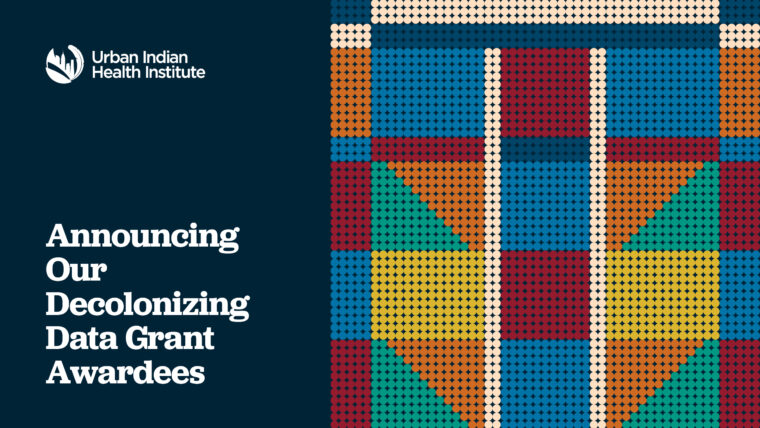Through a grant from the Robert Wood Johnson Foundation (RWJF), we’re awarding grants to 17 recipients to carry out best practices meant to improve data collection for American Indians and Alaska Natives.
Recipients of our Decolonizing Data grants consist of tribes, Native-led health, education, and advocacy organizations as well as state and county departments. These recipients will utilize UIHI resources and advance decolonizing data practices when collecting data for Native people. The resources will consist of our Best Practices for American Indian and Alaska Native Data Collection as well as a guide to navigating complex concepts, such as “Indigenous Data Sovereignty” and the collecting of tribal affiliations.
“I am honored to partner with groups who are dedicated to decolonizing data alongside us. Together, we will expand Indigenous knowledge throughout the country and counter the poor and harmful data practices that were put in place to erase us.”
–Abigail Echo-Hawk (Pawnee), Director of Urban Indian Health Institute
We must decolonize data.
As American Indians and Alaska Natives, we’re often omitted in data collection and analysis due to inaccurate categorization and racial misclassification.
“As a result of systemic inequities in data, Native people are undercounted in local and national data, which leads to an inaccurate representation of social, economic, and health measures and results in a lack of resources being given to Native communities,” said Abigail Echo-Hawk.
The Robert Wood Johnson Foundation (RWJF) is providing support to UIHI with a grant to carry out efforts to spread awareness of and build capacity for decolonizing data.
“We’re excited to support UIHI and its 17 grant recipients to reimagine how data are collected, analyzed, shared, and used by and for Native people to improve health and well-being,” said Lori Melichar, Senior Director, Pioneering Ideas for an Equitable Future at the Robert Wood Johnson Foundation. “These efforts are an important part of moving toward an equity-centered public health data system, as called for by the National Commission to Transform Public Health Data Systems.”
Congratulations to our Decolonizing Data Grant recipients:
- American Indian Cancer Foundation, Saint Paul, MN
- American Indian Health Service of Chicago, Chicago, IL
- Center for Native American Youth at the Aspen Institute, Washington, DC
- Data for Indigenous Justice, Anchorage, AK
- Data Warriors Lab, Lame Deer, MT
- Little Earth Residents Association, Minneapolis, MN
- Lower Brule Community College, Lower Brule, SD
- National Indian Education Association, Washington, DC
- Native Conservancy, Cordova, AK
- Natives for Community Engagement and Equity, West Linn, OR
- New Mexico Coalition of Sexual Assault Programs, Albuquerque, NM
- Red Lake Nation Emergency Youth Shelter, Red Lake, MN
- So’oh-Shinálí Sister Project, Commerce, CA
- Texas Tribal Buffalo Project, Waelder, TX
- Ttawaxt Birth Justice Center, Wapato, WA
- Indigenous Alzheimer’s Disease and Related Dementias Data Advisory Group, New Orleans, LA
- Urban Indigenous Collective, New York, NY

